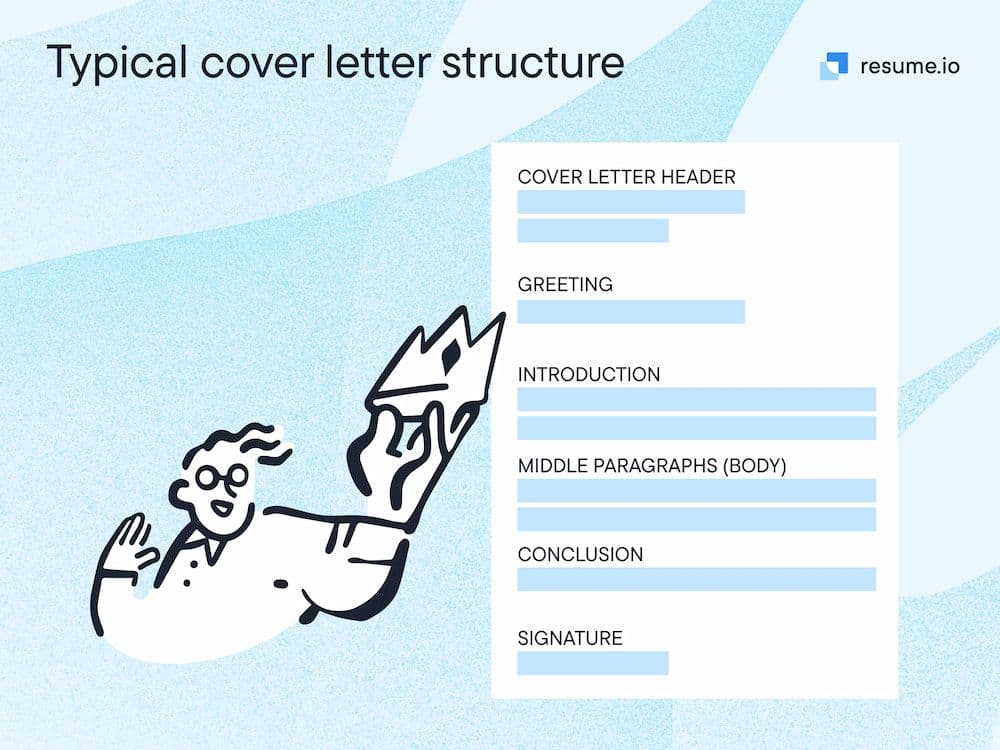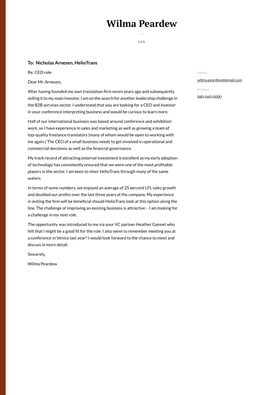You’re probably familiar with resumes, but what is a cover letter? It’s a brief letter that you usually include with your resume when applying for jobs. With the right cover letter, you can make a convincing case for why an employer should hire you.
In this guide, we’ll go over the cover letter definition, what it typically includes, and tips for writing a great cover letter of your own.
What is a cover letter for a job?
A cover letter is a short document that introduces you to a potential employer and explains why you’re a good fit for an open position. It’s usually one page long with three to five paragraphs about your skills, experience, and career path.
Hiring managers expect to see these elements in your cover letter:
- Why you want the job
- How you can make an impact in the position
- What personal qualities you can bring to the team
- Evidence of your research into the job and company
Dear Mr. North,
My experience managing teams through change has taught me that if you put people first, everything else will fall into place. At Labsworth, I led a team through a turbulent 18 months of downsizing, while a blistering period of growth at Pine Inc. provided an entirely different experience. No matter what the trajectory of the company, there are always lessons to be learned.
Since completing my MBA last year, I have wanted to pursue a management role with an international dimension. I haven’t yet been able to use my native Spanish in a business context and feel that your expansion into South America will allow me to employ my change management skills in a cultural setting that is familiar to me.
In a startup, it’s important to employ people with both operational and commercial expertise. I have negotiated contracts worth $9.5M, improved delivery efficiencies by 12%, redesigned warehouse packing flows, overseen staff disputes, and driven profitability to industry-leading levels. In my last year at Pine, I spearheaded three initiatives to improve the net profit from 5.2% to 6.1%. Profits improve when everything is considered.
I also believe in letting my teams dictate the direction of their development. I have experience working with HR to design training modules, something that is particularly useful in a startup. I enjoy the creativity and challenge of working out how to get the most out of a diverse set of professionals. As a result, 60% of my former team have enjoyed promotions over the past five years.
I cannot wait to find out more about your international expansion plans and hope that I am well-placed to assist.
Sincerely,
Lara Fernandez
What is the purpose of a cover letter?
Typically, you send a cover letter in addition to a resume, which outlines your qualifications. After reading your resume, hiring managers may want to know more about you. A cover letter provides additional context about your background, skills, and goals.
A cover letter can also show your personality, giving the hiring manager a chance to imagine how you may fit into their team or company. With a well-written cover letter, your application can stand out and convince an employer to give you an interview.
Use a cover letter template
Designing a cover letter can be tricky. Simplify the process by using a clean, modern Word and Google Docs compatible cover letter template that matches your resume design. We offer free cover letter templates to help you create a letter that shows off your personality and professional brand.
What to include in a cover letter

Prospective employers expect to read clear, organized cover letters in a professional format.
Here’s what you should include in yours:
- Your contact information. Include your full name, phone number, email, and location. For consistency, use the same header on both your cover letter and resume.
- The date. List the month, day, and year that you’re sending the letter.
- The company’s information. Your cover letter should include the name of the hiring manager, their title, the company’s name, and its location.
- A greeting. Address the hiring manager by their full name, such as “Dear Adam Smith.” If you can’t find their name, use their title, such as “Dear Marketing Director” or “Dear Hiring Manager.”
- An introduction. The first paragraph should hook the reader with your enthusiasm. Mention a professional achievement or unique skill that shows you’re qualified for the role.
- A body. Your cover letter body should include one to three paragraphs that expand on your skills and experience. Provide specific examples of how you’ve used your strengths to make a difference in other jobs.
- A conclusion. The last paragraph should summarize your qualifications and include a call to action that makes a hiring manager want to contact you.
- Your signature. End your letter with a professional salutation, such as “Sincerely,” followed by your full name.
For more details and a step-by-step guide, check out our blog on how to write a cover letter.
Don’t use “To Whom It May Concern”
Do your best to address your cover letter to the specific person who will be reading it. Review the job description and the company website to find the hiring manager’s name. You can even call the company to ask for this information.
If you’ve done your research and still can’t find their name, avoid using an outdated greeting, like “ To Whom It May Concern.” In most cases, “Dear Hiring Manager” will work just fine.
Cover letter examples
Still not sure exactly how to format your cover letter or what to include? Check out these cover letter examples for different jobs and experience levels:
Entry-level cover letter
Administrative assistant cover letter
Teacher cover letter
Software developer cover letter
HR manager cover letter
CEO cover letter
Tips for writing a great cover letter
Here are some additional tips for writing a standout cover letter:
Show your personality
A resume provides a factual account of your experience and accomplishments. But a cover letter gives you the chance to show your personality and describe why you want to work there. Offer examples that highlight how you communicate with others, collaborate on projects, and show support to your teammates.
Be enthusiastic
When reading your cover letter, a hiring manager should feel like you really want to work there. Express your excitement for the job and explain why you’re applying for it. For example, you can mention the company’s reputation or recent project that stood out to you.
Tailor your letter to the job
Hiring managers can tell when you’re sending a generic letter that you’ve probably sent to dozens of other employers. Customize your cover letter to the specific job, just as you would with your resume. Look at the job description and make a point to touch on the requirements or skills listed there.
Strike the right tone
Your cover letter should sound professional, but it also needs to align with the company’s culture and environment. For example, a cover letter to a finance company may sound drastically different from a cover letter to a tech startup. Take a look at the company’s website, press releases, and social media pages to understand its tone and adapt your cover letter to match.
Focus on what you can contribute
A prospective employer wants to know how you can help the company meet its goals. As much as possible, connect your skills, experience, and background to the open position. Explain how you can meet the employer’s needs and make an impact in the new role.
FAQs about cover letters
Have more questions about cover letters? Here are answers to some other frequently asked questions:
What is a cover letter, and do I absolutely need one?
A cover letter is a short letter describing your interest and fit for a new position. Not every employer will require a cover letter, but it’s usually still a good idea to send one anyway. A cover letter allows you to expand on your qualifications and make a strong pitch to hiring managers.
How long should a cover letter be?
Your cover letter should be no longer than one page. Most cover letters are between 250 and 400 words. If it’s longer than that, you risk losing an employer’s interest.
What should not go in a cover letter?
Your cover letter should not include:
- Personal details. Avoid mentioning personal information, such as your marital status or age. Providing this information can lead to potential discrimination, so it’s best to leave it out.
- Negativity. Humility is a virtue, but not during your job search. Don’t focus on the experience or skills you might lack. Instead, emphasize what you can bring to the role and why you’re excited about the opportunity.
- Generic phrases. Anyone can call themselves a “hard worker” or a “quick learner.” Use specific language targeted to the role, including keywords from the job description.
Dishonest information. Just like your resume, your cover letter should never exaggerate your qualifications. Be truthful about your skills and experience.












